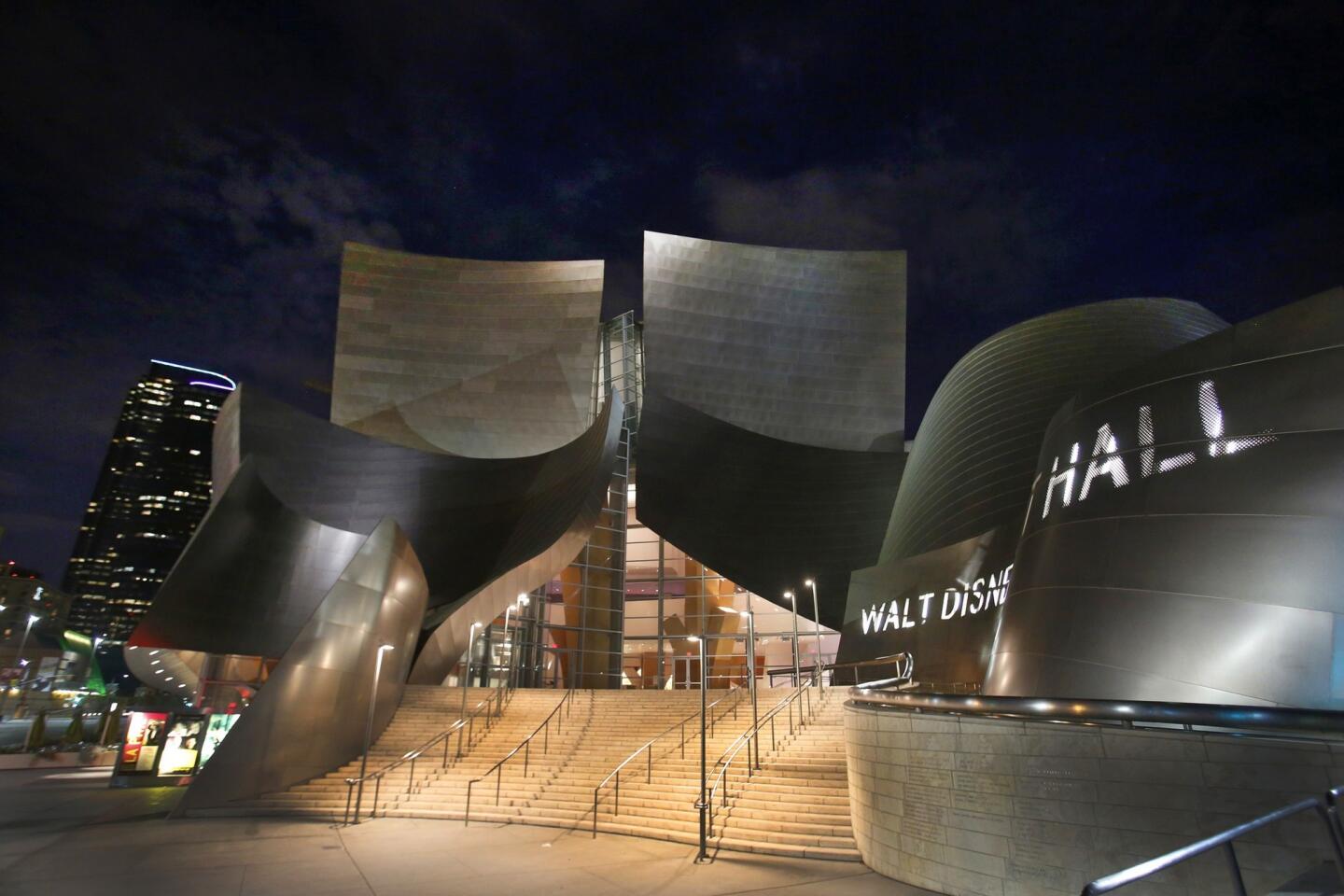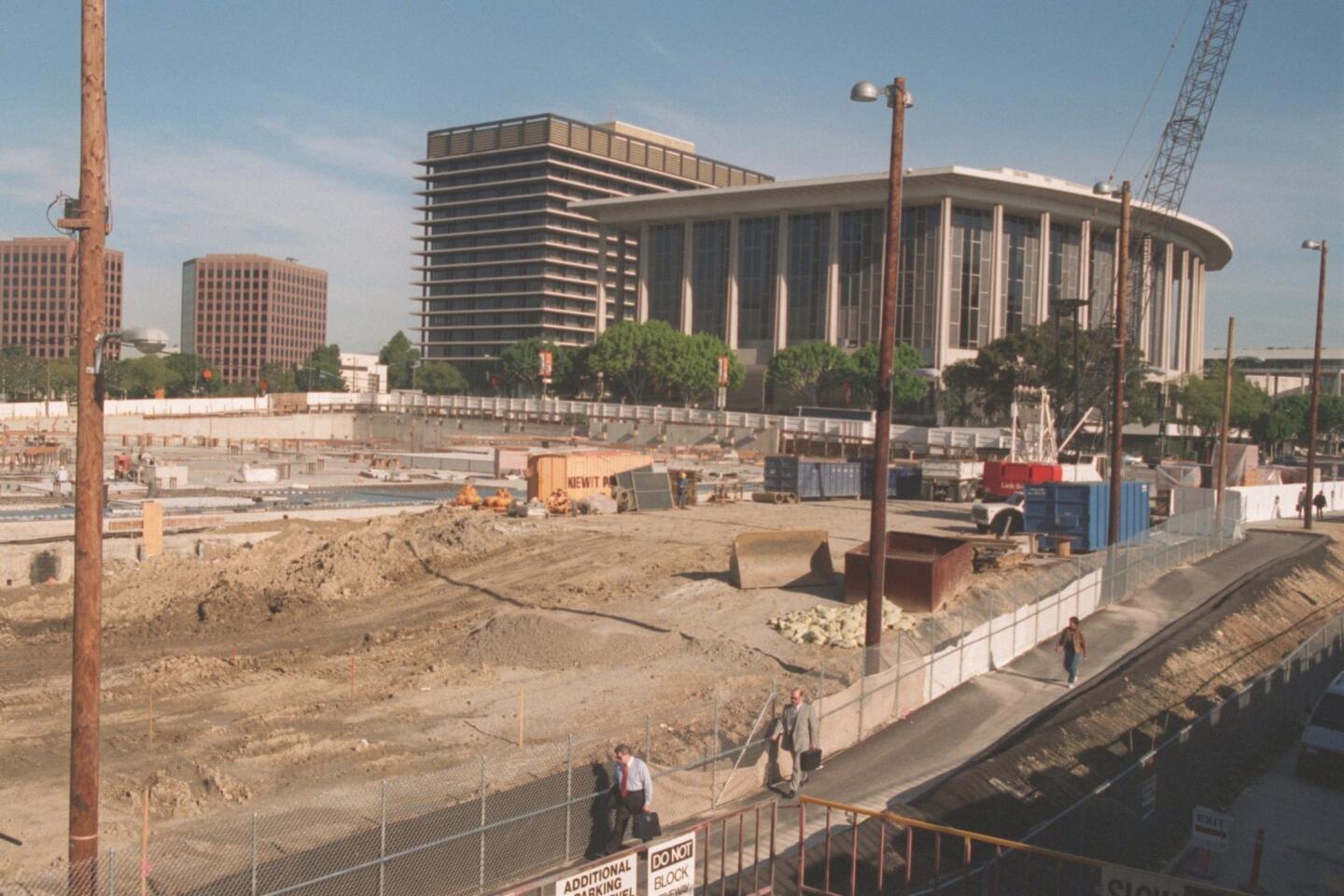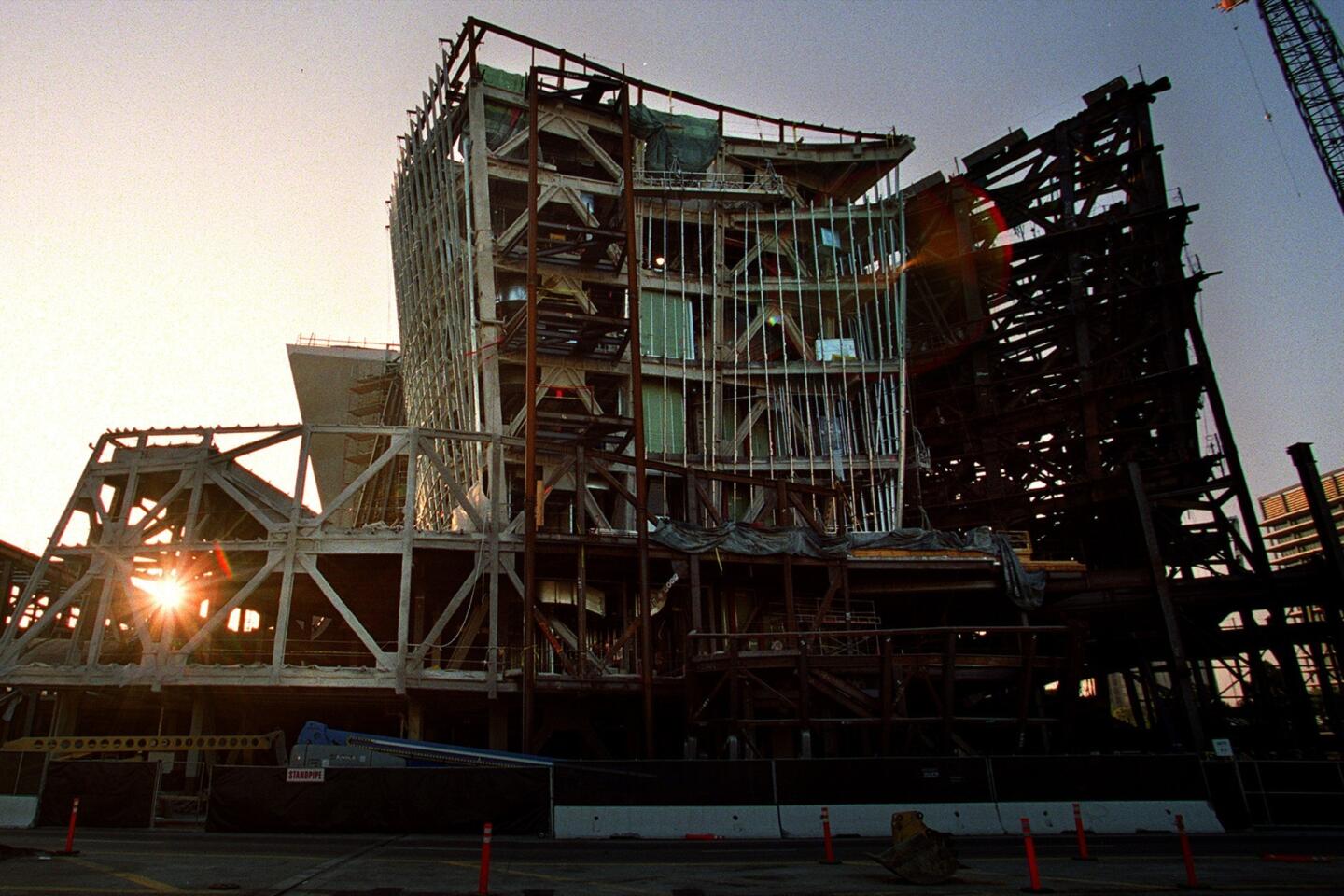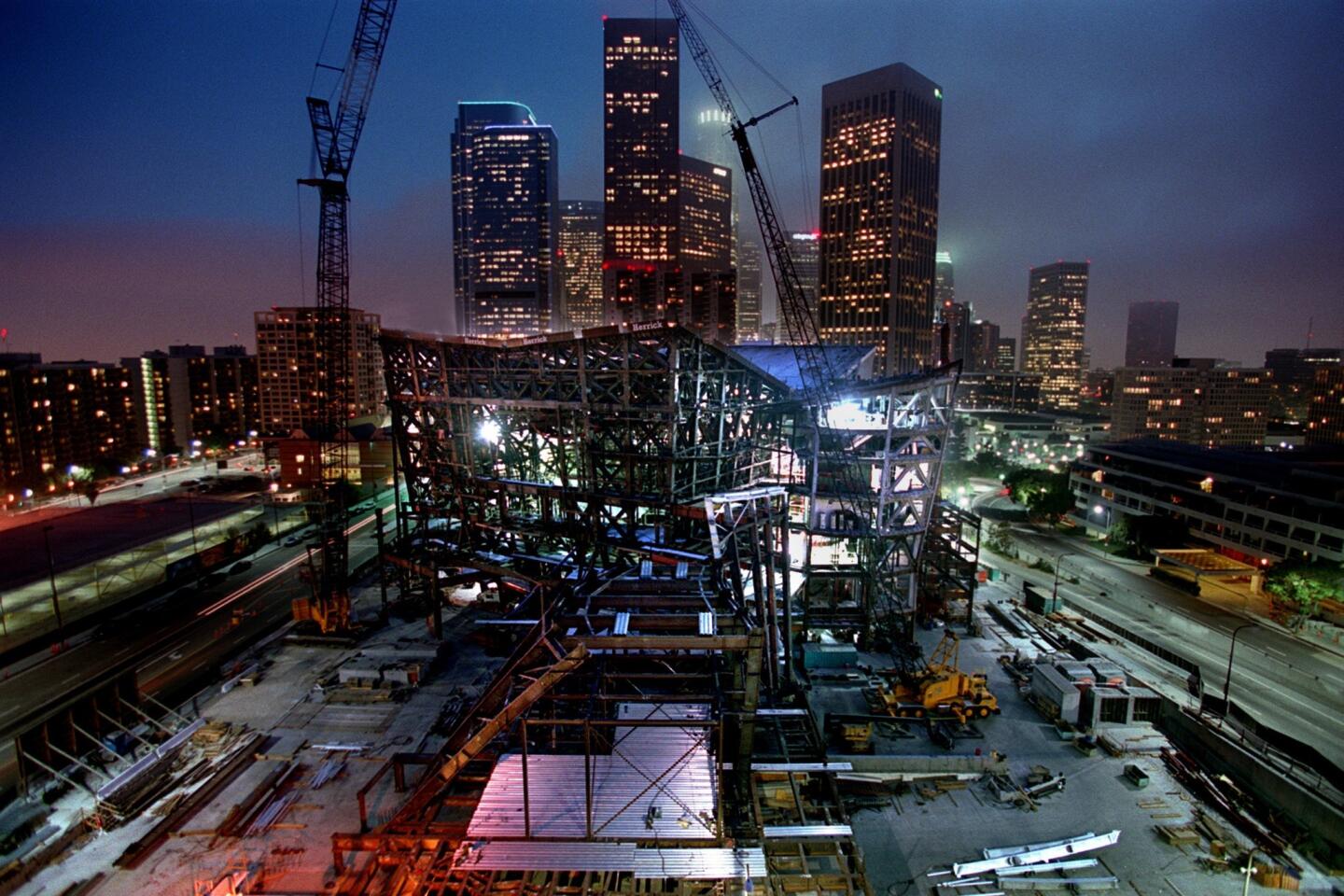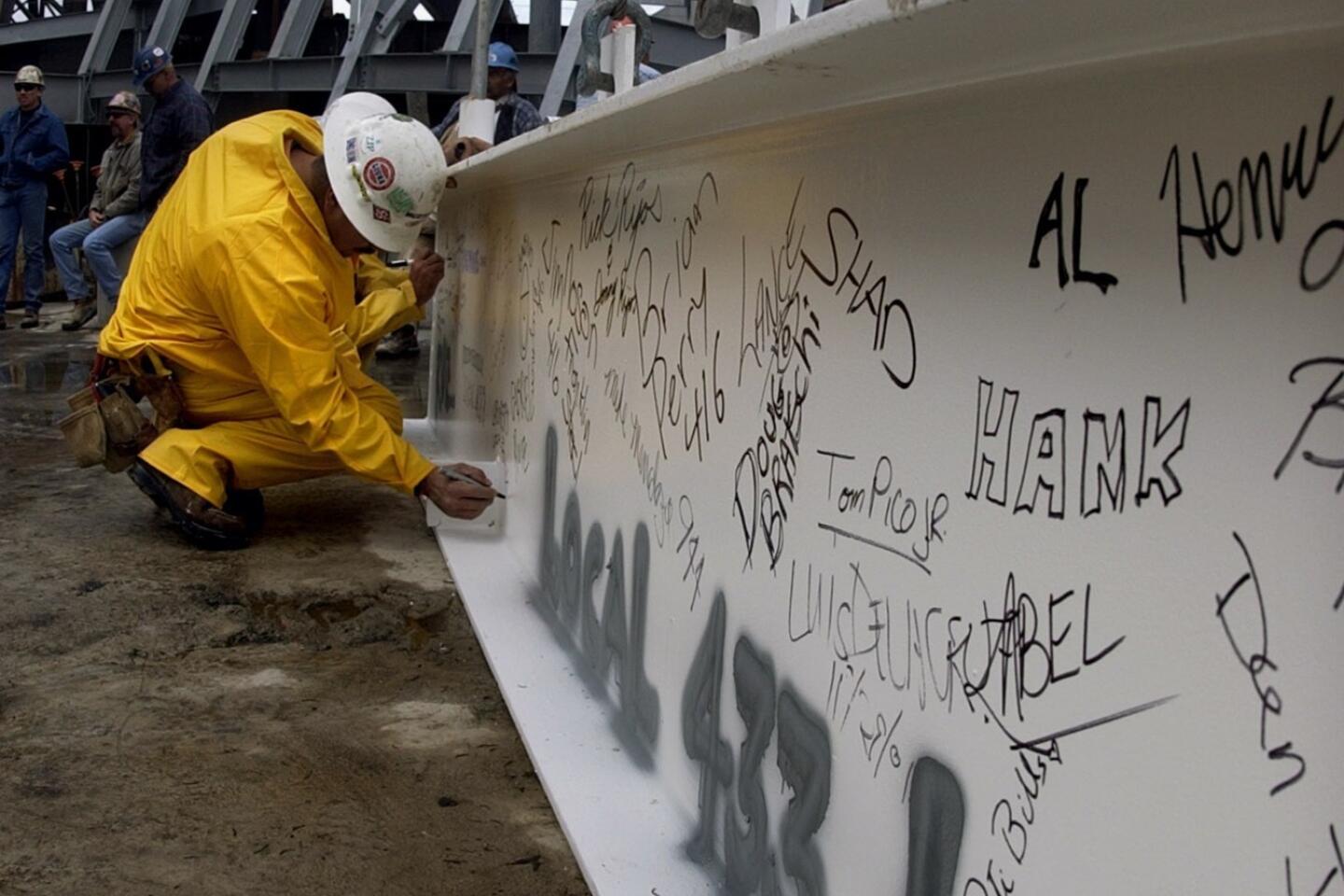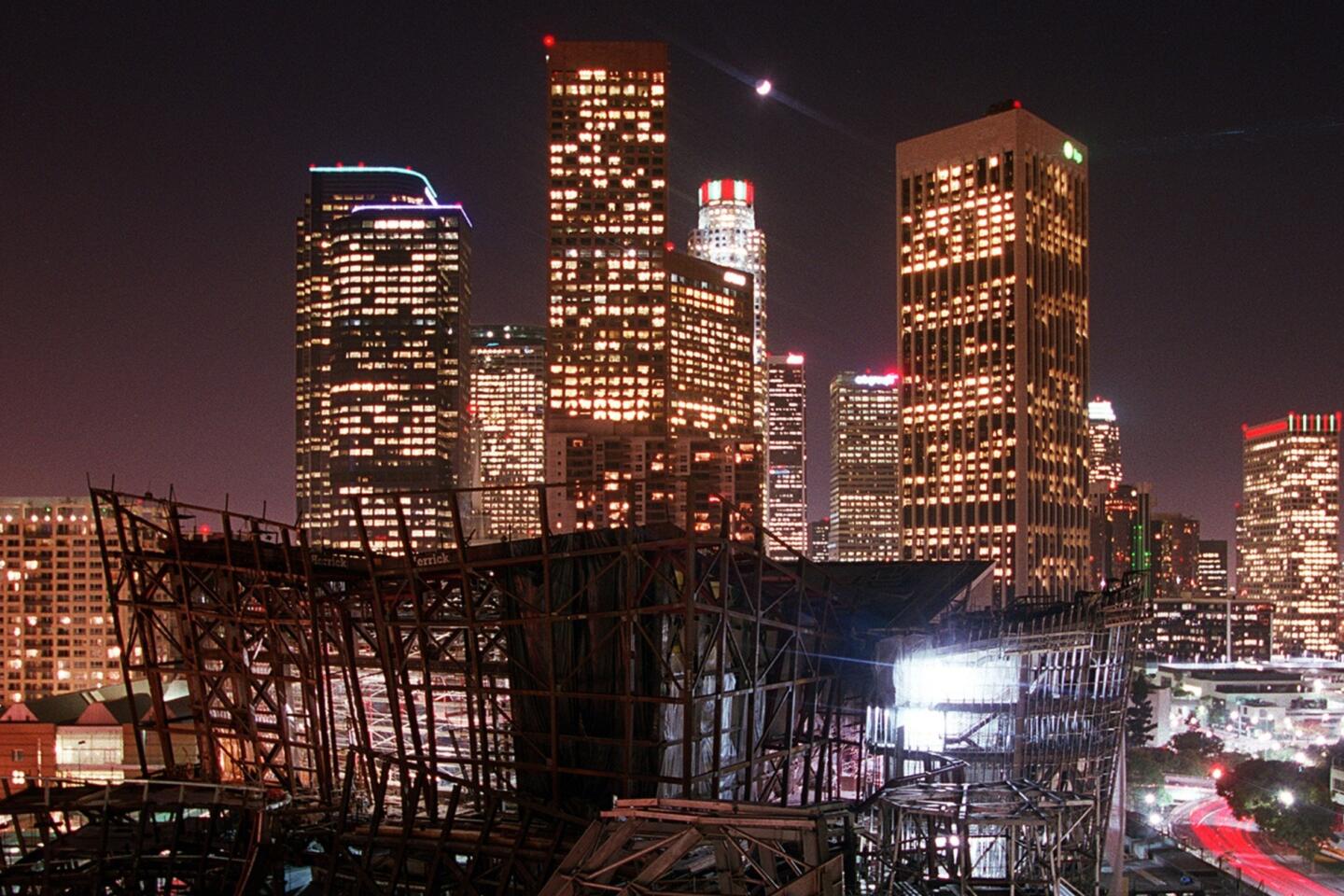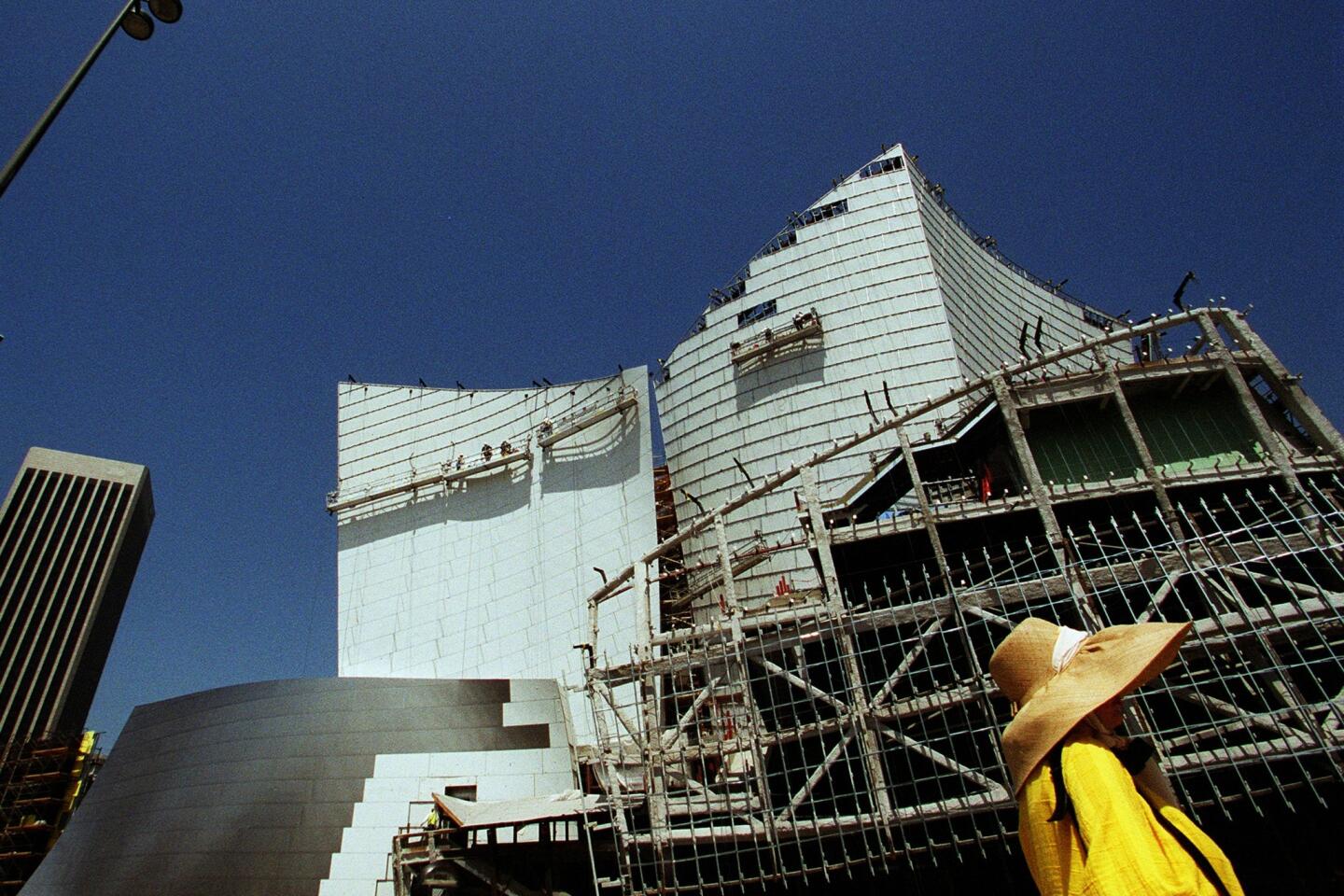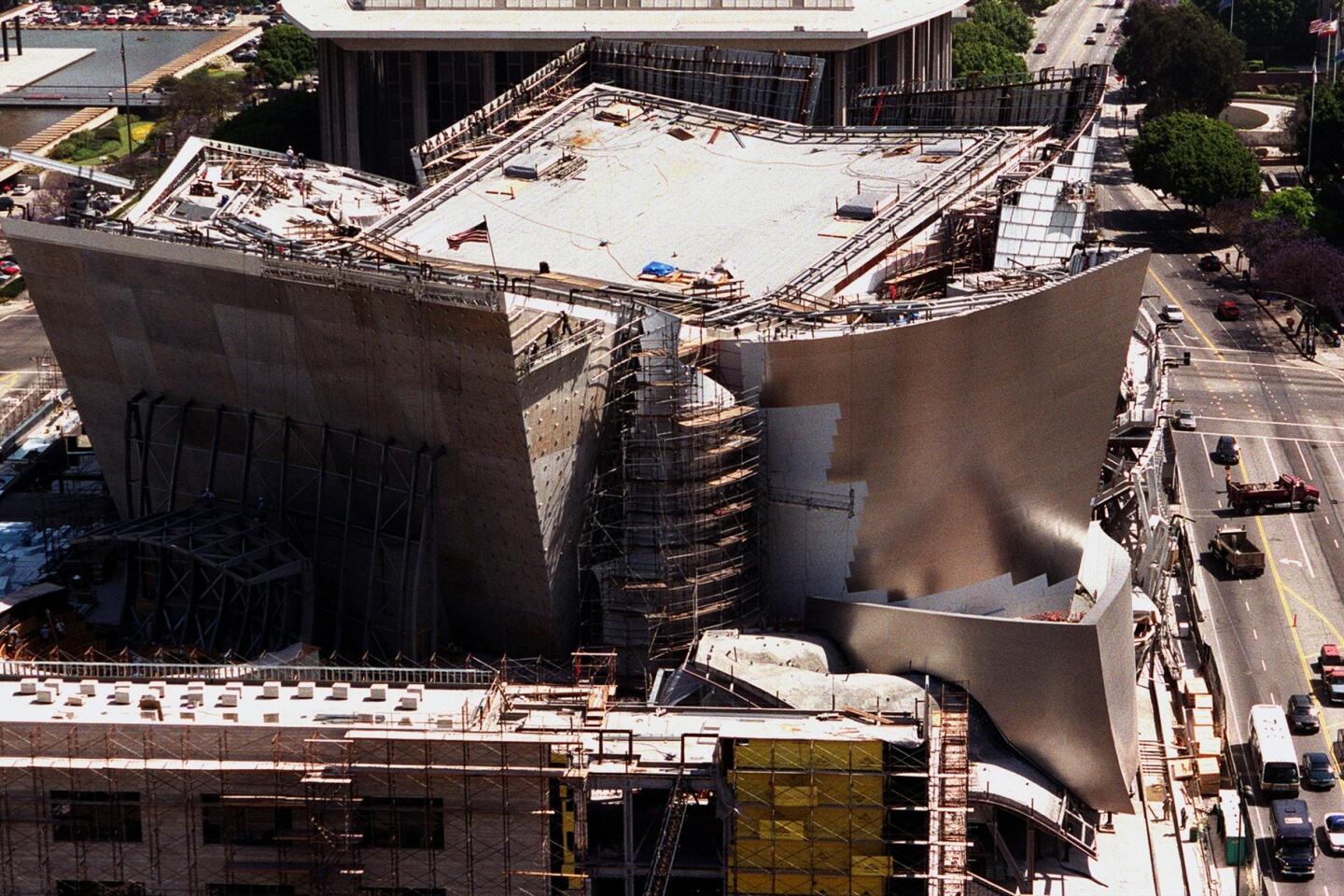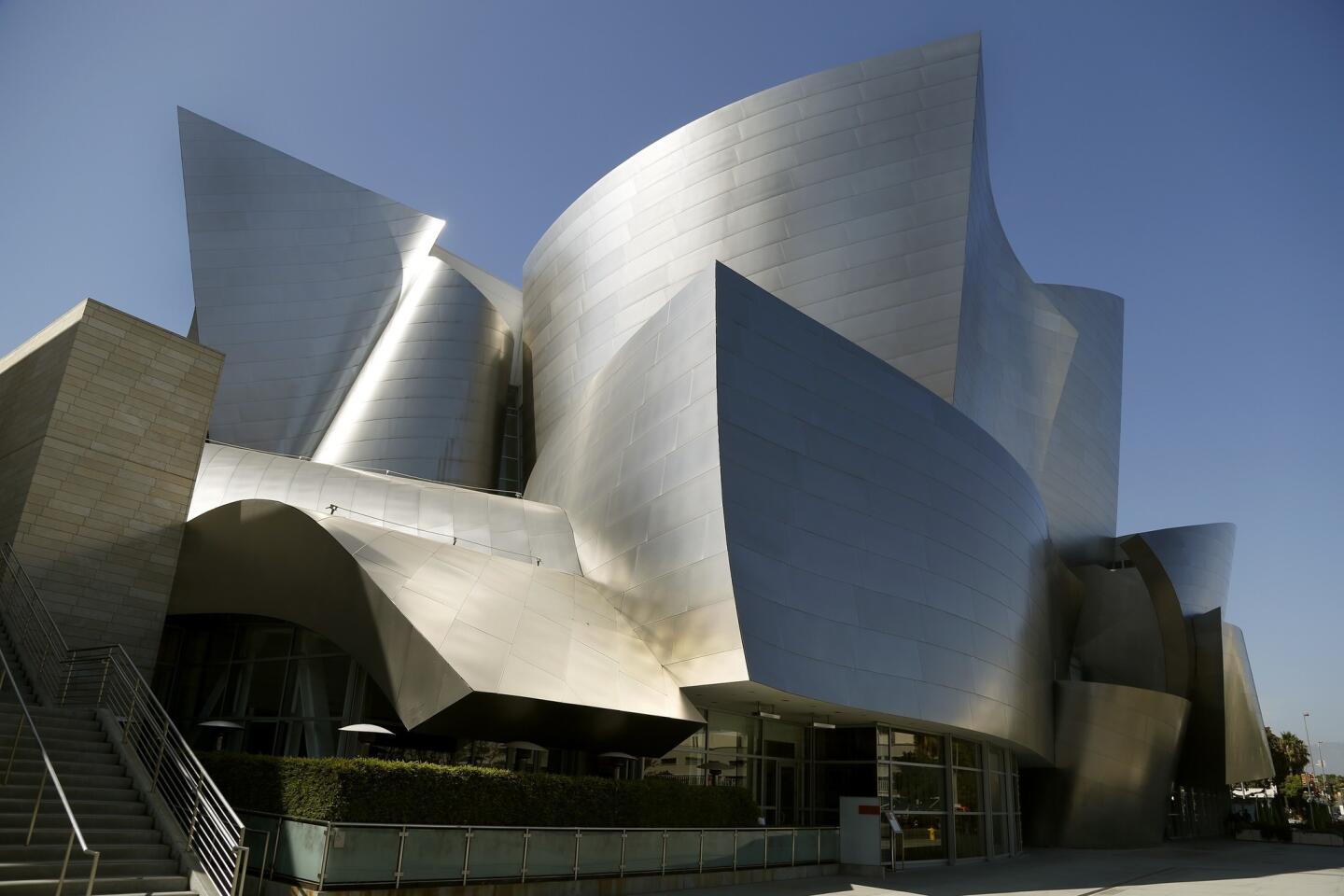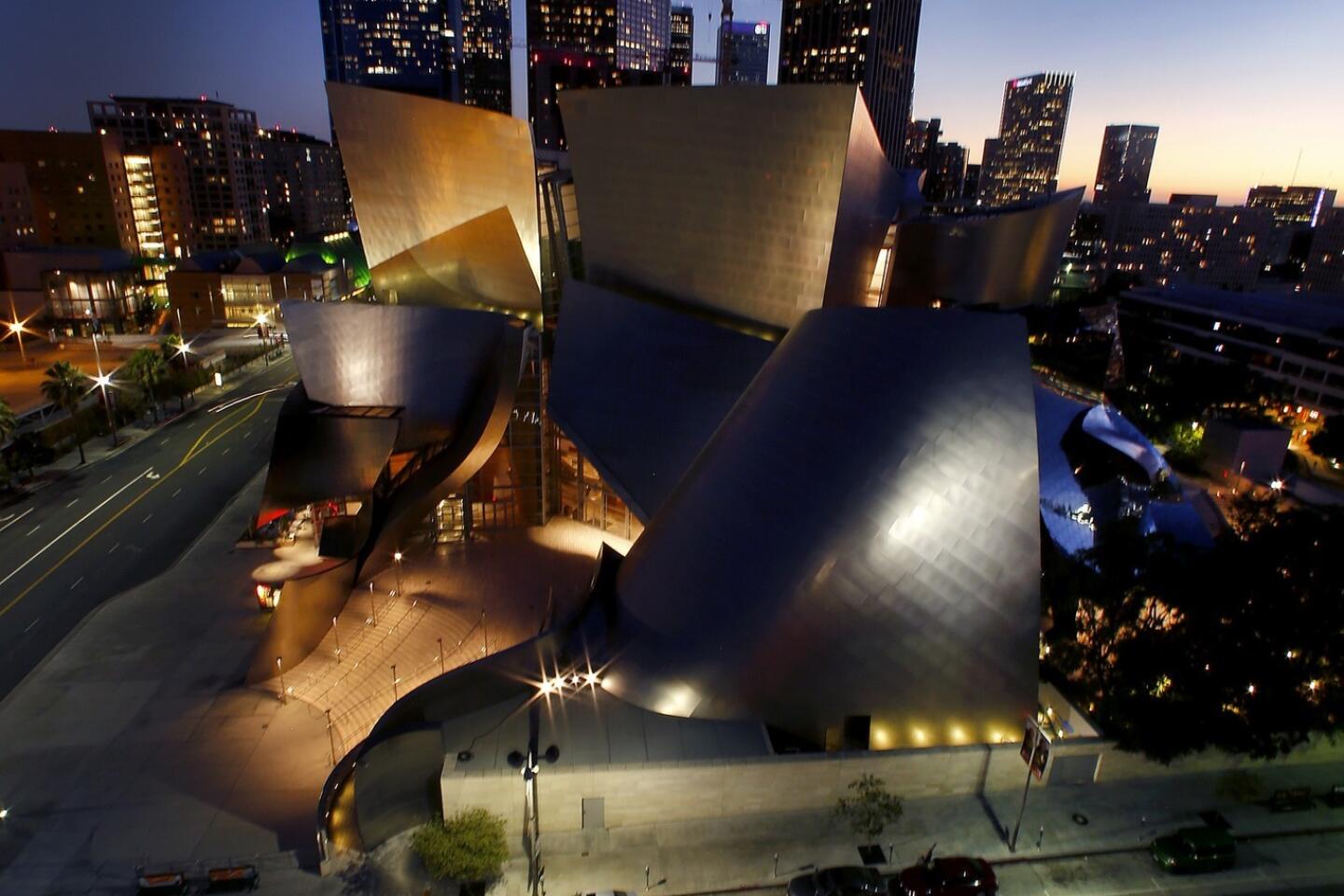A chorus of memories: Disney Hall, as they saw it and lived it
- Share via
Walt Disney Concert Hall turns 10 on Oct. 23. Before the downbeat of the Los Angeles Philharmonic’s new season, here is a look at the first 10 years, as told in the words of those who were there.
First impressions:
Martin Chalifour, concertmaster, L.A. Phil and the first musician to perform in the hall July 30, 2003: “The wood of the stage wasn’t even there, but Frank [Gehry] and Esa-Pekka [Salonen] were too anxious to wait for the acoustical surface. They wanted to know what it would be like. I was so excited — I didn’t even tune my instrument. I played a Bach piece, the opening of Sonata No. 3. I think after that point they got pretty emotional.”
Esa-Pekka Salonen, former music director, L.A. Phil: “We sat there and the miraculous sounds came out of his violin that enveloped us in a way that I hadn’t experienced in a modern concert hall.”
FULL COVERAGE: Walt Disney Concert Hall at 10
Deborah Borda, president and CEO of the L.A. Phil: “I remember the very first rehearsal. It was really a tremendous risk and adventure. We didn’t know how it would sound. So we invited the key donors and players who had made a difference to attend the first rehearsal in the hall. And so we had about 300 people there — Mayor [Richard] Riordan, Eli Broad — I sat between Frank and Yasuhisa [Toyota, the acoustician]. Esa-Pekka came out on stage to start. And the three of us all held hands. And they started to play. And you could tell immediately that it was a very special acoustic. Esa-Pekka stopped conducting and spun around and said, ‘Ladies and gentleman, we have a bass section!’”
John Williams, Oscar-winning film composer and conductor: “It’s our Eiffel Tower.... I was thrilled when I was first able to see the exterior of the building. It looked like if the wind blew, the hall might sing, it might have a beautiful sound.”
Gustavo Dudamel, current music director of the L.A. Phil: “The first time that I was at Disney Hall was the first time I was in L.A. conducting the L.A. Phil. And I remember the first impression was the architecture ... inside of downtown, you have this kind of sun. ‘Let’s see what’s inside, how it works acoustically.’”
TIMELINE: Walt Disney Hall through the years
The difference of the acoustics:
Peter Sellars, director: “Every surface is resonant. So if a person moves his right foot on the second balcony, everyone notices. So everyone is a participant, not just an observer. So the whole place notices if you drop your program. Everyone has to be totally present. The hall demands that people meet its demands. So you can’t exactly relax, because you’re part of the concert. That edge-of-your-seat quality is engineered into the building. You have to pay attention.”
David Howard, clarinetist, L.A. Phil: “There were parts of the orchestra I didn’t hear for 20 years. The string basses — I saw them for many years, but I didn’t hear them until we got to Disney.”
Christopher Hanulik, bass player, L.A. Phil: “The satisfaction the bass section derives from playing in Disney is tremendous given the acoustical challenges we faced at the Dorothy Chandler Pavilion. I don’t want to speak negatively of the Chandler, but listening to the orchestra there was nothing to what was taking place onstage. I felt audience members were not getting the same impact that we were producing on the stage.”
Chalifour: “[Before Disney] when we played, we overplayed. Everything was ingrained in our muscle memory. If you do that regardless of space you can get in trouble. It was a shock [to play at Disney], but a good one.”
Bill Viola, video artist of orchestra’s groundbreaking “The Tristan Project” in December 2004: “I remember when the hall was still young and they were trying to figure out the acoustics — Esa-Pekka was getting really annoyed at hearing a little sound.… They were probing the side halls and all of a sudden they found that one of the panels in the hall was not centered properly.”
Jean-Yves Thibaudet, pianist and frequent guest artist: “It is a big hall, but still when you’re on stage, it feels intimate. Intimate is maybe not the right word, You feel close to the hall. Some halls, you feel like you’re in a barn.... By the way, I have to say that Disney Hall has some of the best pianos in the country. I play a lot of pianos... this is so important to us pianists. They are in such good shape.”
The challenges of Disney Hall:
Salonen: “All of a sudden you could not get away with anything. I think the unique thing about Disney Hall is the clarity and multi-dimensionality of the middle voices. So you can actually hear what the second violins are doing, hear what the violas are doing, hear what the second winds are doing.”
Howard: “The most profound change has been the orchestra’s relationship with the audience. Before, we could have been performing for no one. It became a theoretical experience sometimes. At the beginning, at Disney, it was almost off-putting to have that contact. It was almost sensory overload. But now it’s such a wanted aspect of what we do.”
John Adams, composer who wrote “Dharma at Big Sur” for the hall’s opening gala: “It was opening week at Disney Hall, not a lot of rehearsal time. Everyone was stressed. And it was not a very successful performance, partly because I didn’t realize there wasn’t a sound booth in the hall. And I had to put a soloist behind the orchestra. For me it wasn’t a successful performance. But the Phil understood that, and we brought it back. We got it right.”
Leila Josefowicz, violinist: “My best experiences musically have been there. It’s sort of an amazing place for me. I’ve played different stages of my life there.... Growing up I was more used to the shoe box shape, which I don’t find nearly as a communal an experience. I like having people all round — it’s not more informal, but more of a shared feeling.”
Viola: “The most phenomenal thing was to use the hall in the vertical sense. That just blew my mind. The finale of ‘Tristan’ is this unbelievable ascension — it just goes up and up ... the ability to move the whole audience with it. It was just one of the great moments of my life.”
Salonen: “The real miracle for me and for my colleagues in the orchestra was to come back to all the repertoire we had played in the old hall and to be able to take it to a new level, and scrape the old paint off and start from scratch, but with the knowledge of the music but in a totally new and inspiring sonic milieu.”
Dudamel: “The Mozart Da Ponte cycle that we are doing shows the ability of the hall to be re-created all the time ... we have to honor the place where we play. I think every day when we sit in the hall is like sitting in a temple.”
Can the hall be improved?
Sellars: “I wouldn’t mind if the dressing rooms had access to light or air. Those would be awfully nice in the dressing rooms. You really are in a sealed container.”
Adams: “When you go out of Disney Hall, it’s a very sterile and unfriendly zone... I think the city should close down Olive Street and call it museum mile.”
Ten years later:
Dudamel: “I think this hall will always be young, like Frank Gehry. It will always be full of energy, full of beauty, full of power — young power — and it will always be modern.”
Julie Andrews, Oscar-winning actress and orchestra board member: “It still feels intimate. ‘Reachable’ is the best description for me.... There’s still a fresh feeling to the orchestra there. There’s nothing staid about it. It’s a dream. I attended a concert of Debussy and Stravinsky — I heard simply everything.”
Yo-Yo Ma, cellist who will be playing at the Sept. 30 season-opening gala: “The fact that it immediately achieved an international reputation as one of the great halls was huge. Carnegie will be 125 years old; Boston is more than 100 years old. So to be able to have that kind of iconic status for a hall this young is remarkable.”
Salonen, who returns often to Disney Hall: “I remember I came out of the parking garage and the attendant said, ‘Hi, how are you?’ It was such a total non-event. The orchestra feels like an old shoe in the best possible way.… So as long as I live, it will have a special place in my heart.”
More to Read
The biggest entertainment stories
Get our big stories about Hollywood, film, television, music, arts, culture and more right in your inbox as soon as they publish.
You may occasionally receive promotional content from the Los Angeles Times.
